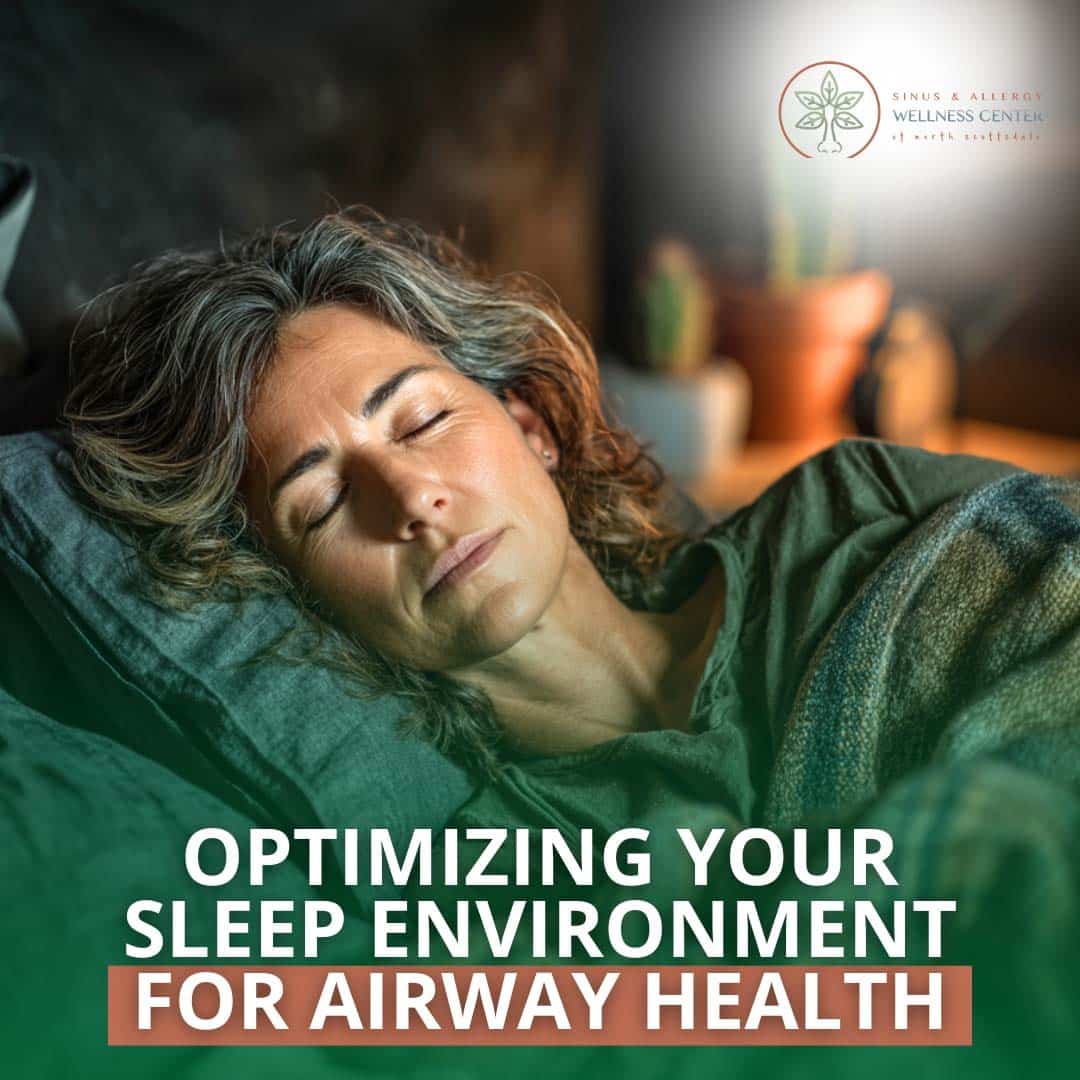Optimizing Your Sleep Environment for Airway Health
Setting yourself up for success starts by establishing good sleep habits. Did you know that your airway health plays a significant role in a good night’s sleep? Snoring, nasal congestion, and dry mouth can significantly interfere with your night.
There are some key things you can do at home today to optimize your bedroom for breathing and airway health.

Backing Up: The Connection Between Airway Health and Sleep
If you’ve ever found yourself constantly blowing your nose at night and adjusting yourself on your pillows to alleviate your congestion—and nothing seems to be helping you breathe better out of your nose—you probably ended up with a night of restless sleep.
At that point, you probably switched to breathing through your mouth—but that doesn’t solve problems. Mouth breathing bypasses your nose’s natural filtration system, allowing allergens and irritants to enter your body unchecked. This can compromise your immune defenses, lower air quality intake, and disrupt sleep by affecting oxygen levels—potentially leading to illness over time.
In addition, all of this can contribute to chronic sleep apnea.
Four Key Elements of a Sleep-Friendly Environment
Luckily, there are a few essential things you can do before you go to sleep tonight to ensure a good night’s sleep.
- Temperature and humidity: The ideal range is 60–67°F, 30–50% humidity. These temperature and humidity ranges are significant for people living in dry climates like Scottsdale, Arizona.
- Air quality: Make use of HEPA air purifiers, allergy-proof bedding, and avoid pet dander and dust buildup.
- Sleep position and pillows: Keep your head elevated to open airways. There are even pillows you can try out that help with snoring.
- Light, noise, and technology: Minimize screens and lights at nighttime, and make an effort to promote nasal breathing before bed.
When to Seek Medical Help
If you’re a chronic snorer and/or find yourself waking up congested at night, it’s time to book an appointment with your medical provider. The Sinus and Allergy Wellness Center staff in Scottsdale is experienced in helping people optimize their sleep by treating snoring, sinuses, and allergies through non-invasive means. Schedule an appointment today to start sleeping better.
During your appointment, we’ll discuss a variety of lifestyle adjustments and treatment options that may work for you, including:
-
Getting your lifestyle habits in check. Specific lifestyle changes can positively impact sleep apnea symptoms. Examples include losing weight, quitting smoking, avoiding alcohol and sedatives before bedtime, and sleeping on your side instead of your back.
-
Over-the-counter allergy medicine and possibly decongestants—and don’t be afraid of generic brands because they are just as effective as the name brands. Getting into a solid routine with allergy medication, nasal steroid sprays, an occasional use of pill or topical nasal decongestant spray and saline rinses can reduce nasal congestion, improve airflow, and potentially reduce snoring. Remember to ask your healthcare provider about using the decongestant medications. These medications may cause an unwanted spike in your heartbeat and blood pressure. Finally, the topical nasal decongestant sprays needs to be used only as recommended on the label.
-
An oral appliance. Oral appliances are specially designed devices that help keep the airway open by repositioning the jaw or tongue during sleep. They can be an effective solution for individuals with mild to moderate sleep apnea or for those who find CPAP therapy uncomfortable. Talk to your dentist about this option at your next scheduled cleaning appointment. It’s possible that your medical insurance may pay for the appliance.
-
Sleep studies. A professional sleep study which provides your healthcare provider the apnea-hypopnea index which determines whether obstructive sleep apnea (OSA) is present or not. A higher number means a more severe stage of OSA. This study is typically conducted in a medical setting but some may qualify for a home sleep study. These studies assist health professionals in diagnosing and treating you depending on the severity of the OSA condition.
-
A balloon sinuplasty with turbinate reduction. Balloon sinuplasty is a minimally invasive outpatient procedure that aims to improve nasal airflow by opening blocked sinus passages reducing sinus and nasal mucus membrane inflammation.
-
Turbinates are small structures in the nose that clean, humidify, and heat air as it passes through the nose and into the lungs. With continued inflammation, they get too big. Bigger turbinates cause more nasal blockage during the day. This can possibly disrupt your maximal exercise potential, reduce your attention to details at work, and places you at more risk for infections by over stressing your immune system. And then at night, they get even bigger due to more blood flowing into the head from our change in body position. When we stand upright during the day, gravity pulls more blood into our belly and our legs, then at night, we lie horizontally in our bed and then more blood moves into the head and nose so these enlarged turbinates cause more sleep disruption, snoring and apneas.
Conclusion
Optimizing your sleep environment supports better breathing and overall wellness. If you’ve assessed your current routine and bedroom setup, and there’s room for improvement, schedule an appointment with your local sinus and allergy team today. At the Sinus and Allergy Wellness Center in Scottsdale, we can help you sleep better tonight for an even better tomorrow.
Disclaimer:
The information provided in this article is for informational and educational purposes only and does not constitute medical advice. It is not intended to diagnose, treat, cure, or prevent any disease or medical condition. Always seek the guidance of your physician or other qualified healthcare provider with any questions you may have regarding a medical condition or treatment.
Results may vary: Treatment outcomes and health experiences may differ based on individual medical history, condition severity, and response to care.
Emergency Notice: If you are experiencing a medical emergency, call 911 or seek immediate medical attention.



